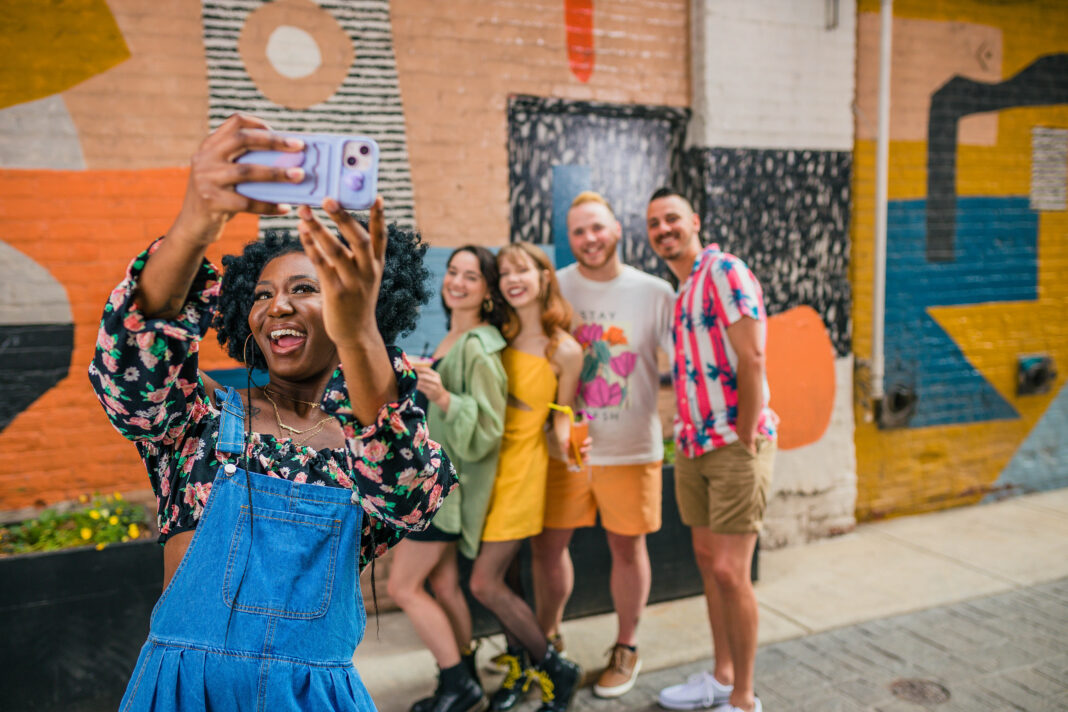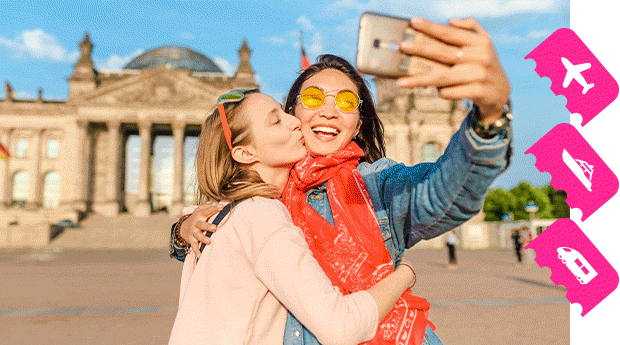In the mid 20th century, Detroit, Michigan, was among the biggest and wealthiest cities in the United States, powered mostly by the automotive industry—yeah, it’s a very butch way to get rich.
But since the 1960s, the Motor City’s population has slipped from almost two million people to about 630,000, prompting critics and boosters alike to obsess about its various declines and rebirths. Detroit has been grappling with its loss of status, and what its future should be, for almost 75 years now.
For queer visitors, though, the most important thing is what Detroit has held on to. Is it a fun place to visit, with lots of LGBTQ2S+ things to do?
The answer is yes. It’s still got many of the cultural institutions and verdant neighbourhoods it had when it was on top, and all the delicious early 20th-century architecture that comes with them. The downtown is packed with Art Deco, Neoclassical, Beaux-Arts and Romanesque gems from the Gilded Age. Its early French history can be seen in the Catholic churches and French street names along its waterfront.
Detroit has also held on to its spirit—and I’m not just talking about the loin cloth–wearing bronze statue called The Spirit of Detroit, which is at the bottom of the city’s main street, Woodward Avenue. Detroiters have a cocky can-do attitude, and the capacity to have a good time under any circumstance. They’ll literally dance among the ruins.
Did I mention dancing? The home of Motown and North American techno may not have as many gay bars as it used to (which city does?), but it’s got some amazing LGBTQ2S+-focused and -friendly venues where the music legacy lives on. The massive outdoor electronic music festival Movement attracts a huge gay contingent, and this year’s edition, running May 25 to 27, features queer DJs like Honey Dijon and LP Giobbi. The mammoth queer party Club Toilet is usually held during the Movement weekend, last year at the Menjos Complex (see details below).
Here’s a quick, dirty LGBTQ2S+ guide to a city that likes it a little rough. Pull on a toque and get yourself a cocktail… or IPA.
Detroit 101
While many U.S. cities have downtowns that empty out after dark, Detroit takes this to an extreme. Not because it’s edgy—it’s just underpopulated. Yet that’s changing. There are several hip and high-end bars and restaurants to try out. The recently relaunched and painstakingly restored Book Tower (1265 Washington Blvd., Detroit) has a hotel and three resto-bars, including the rooftop Kamper’s, that will wow even the fussiest queen. The Monarch Club (33 John R St., Detroit) is a plush penthouse bar from which to ogle the skyline.
There is no definable gay village. In fact, most LGBTQ2S+ venues are, to an outsider, located in unexpected places, like strip malls and in nearby small cities like Ferndale, Royal Oak and Pontiac—yes, there’s as much or more gay life in the suburbs as there is in Detroit proper. Many residents and businesses of Ferndale, in particular, fly the Pride flag as a demonstration of the city’s progressive, almost bohemian identity. A stroll along West Nine Mile Road, between Woodward Avenue and Livernois, with its brunch places, coffee shops, vintage stores and an artisanal market, makes for a pleasant weekend afternoon. The city of about 20,000 hosts a surprisingly well-attended Pride (more information below), as does the neighbouring city of Royal Oak, which has a population of about 60,000. The area around Royal Oak’s Main Street, between Farnum Avenue and W. 7th Street, also has hang-worthy shops and boutiques, notably Noir Leather (124 W. 4th St., Royal Oak), a queer-friendly kinkster hub that sometimes hosts events.
Metro Detroit’s sprawl means that doing a bar crawl of its dozen (depending how you count) gay watering holes usually means … driving. Yeah, in a car. Public transit, especially between municipalities, leaves a lot to be desired. Ferndale and Royal Oak, as well as the student-and-hipster-oriented midtown area called Cass Corridor, are among the few areas where a visitor or resident could pleasantly get around as a pedestrian.
Downtown Detroit is encircled by a small elevated train called the People Mover, which might save you 10 minutes on a 20-minute walk from Greektown, where there are casinos and a few good restaurants and bars, to Grand Circus Park. The QLine streetcar, which runs along Woodward from Congress Street to Grand Boulevard, is more useful for visitors, going past some of the city’s most popular attractions, including Ford Field (2000 Brush St., Detroit), Detroit Opera House (1526 Broadway St., Detroit), Little Caesars Arena (2645 Woodward Ave., Detroit), the Detroit Institute of Arts (5200 Woodward Ave., Detroit), the Museum of Contemporary Art Detroit (4454 Woodward Ave., Detroit) and the Charles H. Wright Museum of African American History (315 E Warren Ave, Detroit). Both transit systems are free in 2024.
Pride
Motor City Pride takes place in 2024 on June 8 and 9, with entertainment and community events centring on Hart Plaza, right on the waterfront at the bottom of Woodward Avenue. (That’s also where the Movement Music Festival happens.) The parade, on June 9, starts at Campus Martius Park and ends at Hart Plaza. About 65,000 people attend the festival, which is supported by more than 200 volunteers.
As we already mentioned, Ferndale Pride (June 1, 2024) and Royal Oak Pride (August 4 and 5, 2024), are well-attended, well-organized events with entertainment stages.
Clubs
The difference between club and bar can be murky, but we’ll define “club” as a place that has designated areas for shows and dancing.
Menjos/Olympus/Eagle (938 W. McNichols Rd., Detroit). With its 1990s gay bar vibe, Menjos is a male-majority-but-all-inclusive space built for dancing and happenings like drag shows, karaoke and underwear contests. There’s a theme almost every night, cover on the weekends. If it’s quiet, you can check out the small boutique selling underwear and adult toys. Next door is the event space Olympus. The Eagle, which opens around midnight and gets busy at around 2 a.m., has a men-only after-hours vibe. In 2023, they connected the three spaces for the megaparty Club Toilet, held during the Movement Music Festival.
Gigi’s (16920 W. Warren Ave., Detroit). The basement cabaret, which has been in operation for 50 years, fills up every Saturday night for a 90-minute drag show that starts pretty promptly at 11 p.m. The show is so legendary, they sell commemorative T-shirts and other souvenirs. On the main floor, there’s a dancefloor that, depending on the DJ, fills up with a fun-loving mixed-gender crowd.
Pronto! Lounge Showbar (608 S. Washington Ave., Royal Oak). Next door to Pronto! Diner, which is a fun place to eat, this gay club is big and fun enough to attract queers from around the metro area. Regular events, like karaoke and lesbian night, run on a monthly schedule, while special events might offer appearances by RuPaul’s Drag Race alumni or porn stars.
SOHO/215 W (205 W. Nine Mile Rd., Ferndale). The main space is a comfy storefront lounge, suitable for dropping by for after-work drinks or later at night to see which hotties are out and about. Next door is a special event space that hosts drag shows, dance parties, leather mixers and other gatherings.
Innuendo Nightclub (744 E Savannah St., Highland Park). All are welcome at this LGBTQ2S+ venue, but women of colour should feel especially comfortable. Actually, if you don’t like dancing, this may not be your place—the twerking competition really gets the crowd going. Table service, bottle service, speed dating, shots contests.
Bars
Hayloft Saloon (8070 Greenfield Rd., Detroit). Bears, daddies, leathermen and other assorted men’s men gather at this roadhouse-style bar with a pool table and jukebox. Bigger than you expect.
Liberty Bar & Poutinerie (85 N Saginaw St., Pontiac). This throwback storefront bar, with vintage wooden shelving behind the bar, attracts a laidback LGBTQ2S+ crowd, along with their allies. On weekends, grab a spot at the bar to watch retro music videos. Euchre on Tuesdays, karaoke on Thursdays. They’ve been known to host a leather party or two.
Adam’s Apple Bar (18931 W. Warren Ave., Detroit). Recently celebrating its 10th anniversary, this easygoing bar is a welcoming venue for trans women and their allies. Labels aren’t important here—pull up a stool, check out the jukebox and make some new friends.
Venues that host queer events
Spot Lite Detroit (2905 Beaufait St #4, Detroit). Don’t freak out on the journey through a desolate neighbourhood to get to one of Detroit’s premiere DJ venues. Once you’re on the block, you’re fine. And when you’ve been here once, you’ll be back. With a coffee shop, art gallery and record store on the premises, this former pickle factory is an all-day venue. But the lines form after midnight, attracting LGBTQ2S+-friendly crowds who are—say it loud—here for the music. House primarily, but it can be all over the place.
Temple Bar (2906 Cass Ave., Detroit). If you love retro hipster dive bars and wood panelling, you’ll feel at home here any day of the week. But come out for queer DJs, like at the monthly-ish Delicious party, and you’ll really be among your own.
Common Pub Detroit (5440 Cass Ave., Detroit). Depending on the season, this Cass Corridor pub hosts Friday night Drag Race watch parties. These events are cohosted by Parasol Detroit, a promoter best known for their queer summertime “staycation” pool parties.
Further away but worth it
Necto (516 E Liberty St, Ann Arbor). Probably the biggest venue on this list, this multi-level dance club has been hosting its weekly Pride Friday since 1984. High-energy dance tracks or top-40, it’s your choice. Ann Arbor is a student town, about a 45-minute drive from Detroit, so the crowd can be very young.


